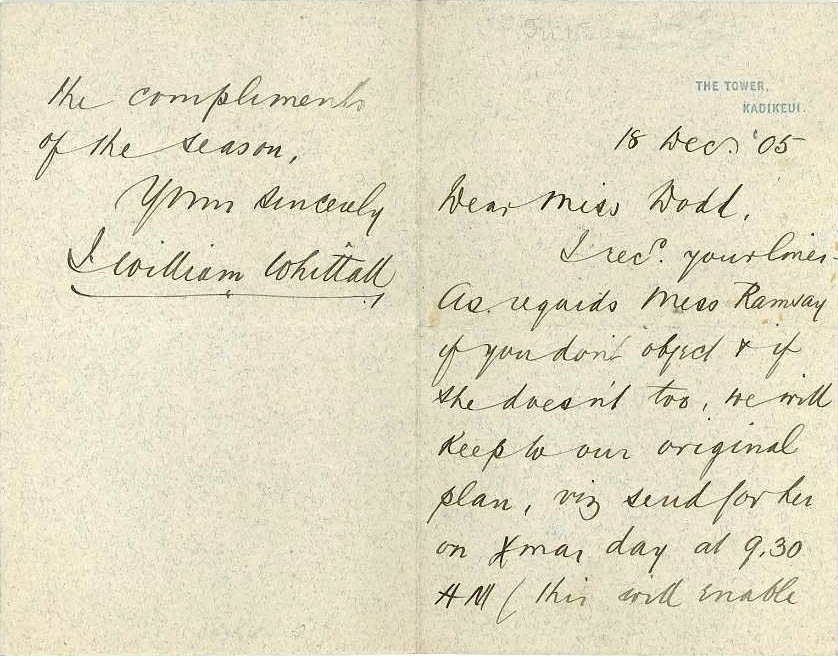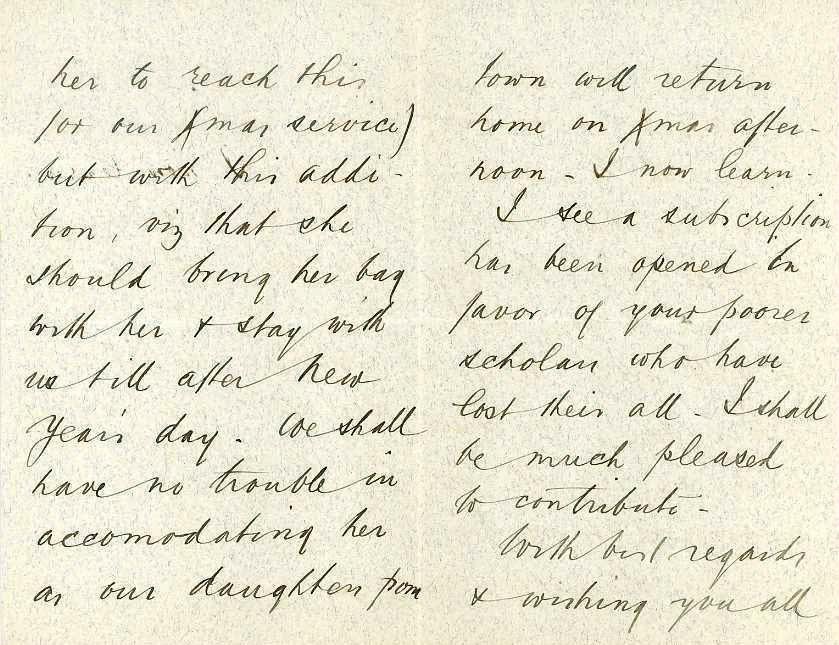Letters only survive if the vagaries of time are kind to them, and often they are first to be lost in ‘clear-outs’. In addition letters were usually of a commercial nature giving little insight to daily lives, but clues can also be gleaned, like in this brief letter.


Sent Dec. 18, 1905, The Tower, Kadikeui [Moda, Constantinople, Turkey], by Sir (James) William Whittall (1838-1910), founder of the British Chamber of Commerce of Turkey, founder of J.W. Whittall & Co. of Constantinople (large supplier of opium), and the President of an Armenian Relief Assoc. The letter is to Miss [Isabel] Dodd, former head of the American College for Women in Constantinople, Turkey, a missionary effort to keep Christianity alive in this predominantly Muslim area. Sir Whittall writes, in part: “… as regards Miss Ramsay, if you don’t object & if she doesn’t too, we will keep to our original plan, viz send for her on Xmas day at 9:30 A.M. (this will enable her to reach this for our Xmas Service) but with this additions, viz that she should bring her bag with her & stay with us till after New Year’s day. We shall have no trouble in accommodating her as our daughters from town will return home on Xmas afternoon I now learn. I see a subscription has been opened in favor of your poorer scholars who have lost their all. I shall be much pleased to contribute…. Yours Sincerely, J. William Whittall.”
[On Dec. 15, 1905, a fire broke out at the American College’s main building, Barton Hall, from a defective chimney. The inside of the building was completely burned with only the walls standing. No lives were lost and a portion of the contents of the building were saved. However, 45 girls and some of the teachers lost all their possessions. Undoubtedly, this is the subscription for poorer scholars referenced at the conclusion of Sir Whittall’s letter.]
Sir (James) William Whittall was born in Smyrna (today Izmir Turkey), the son of James Whittall, and grandson of Charlton Whittall, who were merchants for the Levant Co. in Turkey from the early part of the 19th century. He was educated in England and initially remained there to work. In 1861 he joined a mercantile firm in Britain, becoming a leading partner. Ill health forced him to leave Britain in 1873 and he decided to return to the Ottoman Empire (i.e., Turkey) to work with his families established business. With his great uncle, Sydney La Fontaine, he founded the J.W. Whittall and Co., Constantinople. It became the leading mercantile house in Constantinople. Among the articles they traded in was opium, being a large (if not the largest) supplier of Turkish Opium to Britain. [In the early 20th century, one of the Whittall spin-off companies, Whittall Saltiel Co. Ltd., specialized in the export of opium]. Shortly after founding his company, William also founded the British Chamber of Commerce of Turkey and served as its president until his death. A noted humanitarian, he served as President in Constantinople of the Armenian Relief Committee, which assisted with the location of 250,000 Armenians to the various regions of Asia Minor. A hunter, he discovered (at least, from the British perspective) the Great Stag and the Great Fallow Deer of Asia Minor (a variety of Roe Deer) which was named after him (i.e., “Whittall.”). In 1898 he was knighted by Queen Victoria for assisting the Armenians during the 1895 pogroms. During the 1909 mutiny (when conservative soldiers, teachers and students from religious schools rose up against the government) the Turkish Commander of the 1st Army Corps, Mahmud Mukhtar Pasha, took refuge in Whittall’s home [The Tower], which was surrounded by Turkish troops. Under the terms of the capitulation the soldiers could not enter the Tower grounds, and there was a stalemate for a brief period of time. Finally, the Pasha disguised himself as a sailor from Sir Williams yacht, the Abafna, and eventually made it safely to a German ship. Sir William died at the Tower in April 1910. His funeral was the largest concourse of people present at the funeral of any Englishman in Constantinople. Representatives from most faiths attended, including the Bishop of Dafnoussia, representing the Bishop of Chalcedon and the Greek Patriarch, a Delegate of the Armenian Patriarch, an Armenian Priest who represented the Armenian Community of Kadikeui and a Deacon of the Greek Church of Kadikeui. The streets were also lined with children of the Greek and Armenian schools, and two Rabbis representing the Jewish Community. The shops of the streets lining the funeral procession at Kadikeui were closed. The procession stopped outside the Armenian church of Kadikeui and a priest came forward and recited prayers whilst the bells of that church and of the Greek church of St. Euphemia were being tolled. Pall bearers included the British Ambassador, Sir Gerard Lowther and Vice Admiral Sir Henry Woods Pasha.